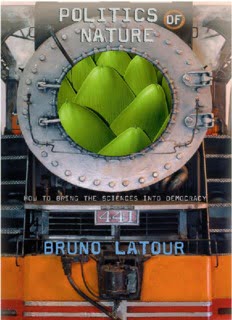Politics of Nature: How to Bring the Sciences into Democracy – The French Ministry of the Environment, through its Division of Studies and Research, has generously supported this unconventional basic research project that aimed from the outset at the production of a book (contract no. 96060). It goes without saying that the ministry is in no way responsible for the result.

Politics of Nature: How to Bring the Sciences into Democracy
This book could not have progressed without the invaluable work done by Florian Charvolin on the Ministry of the Environment, by Rémi Barbier on waste products, by Patricia Pellegrini on farm animals, by Elizabeth Rémy on high-tension power lines, by Jean-Claude Petit on nuclear reactors, by Yannick Barthe on the burial of radioactive waste, and by Vololona Rabeharisoa and Michel Callon on the French Muscular Dystrophy Association.
What Is to Be Done with Political Ecology?
What is to be done with political ecology? Nothing. What is to be done? Political ecology!
All those who have hoped that the politics of nature would bring about a renewal of public life have asked the first question while noting the stagnation of the so-called “green” movements.
They would like very much to know why so promising an endeavor has so often come to naught. Appearances notwithstanding, everyone is bound to answer the second question the same way. We have no choice: politics does not fall neatly on one side of a divide and nature on the other.
From the time the term “politics” was invented, every type of politics has been defined by its relation to nature, whose every feature, property, and function depends on the polemical will to limit, reform, establish, short-circuit, or enlighten public life.
As a result, we cannot choose whether to engage in political ecology or not; but we can choose whether to engage in it surreptitiously, by distinguishing between questions of nature and questions of politics, or explicitly, by treating those two sets of questions as a single issue that arises for all collectives.
While the ecology movements tell us that nature is rapidly invading politics, we shall have to imagine—most often aligning ourselves with these movements but sometimes against them—what a politics finally freed from the sword of Damocles we call nature might be like.
Read Also: College & University Notes
Disclaimer:- Dev Library is not the owner of the books and neither does it create books. We just provide the links of the book for the rural and poor students who don’t afford to buy books. Those E-Books and Pdfs are already available on the internet. For any reason, if someone thinks that I’m violating any laws or if anyone has any issues regarding this, please feel free to Contact Us.

Hi, I’m Dev Kirtonia, Founder & CEO of Dev Library. A website that provides all SCERT, NCERT 3 to 12, and BA, B.com, B.Sc, and Computer Science with Post Graduate Notes & Suggestions, Novel, eBooks, Biography, Quotes, Study Materials, and more.




